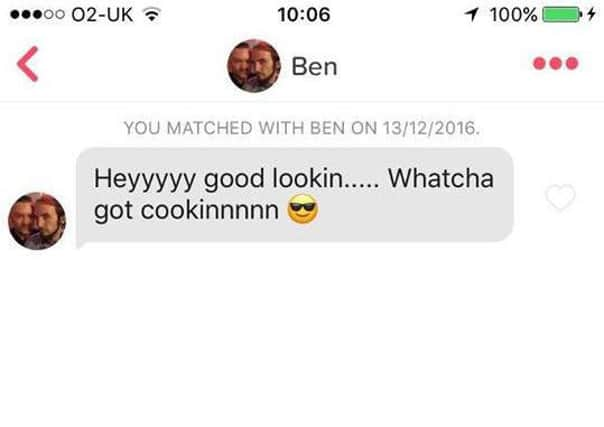Are some Tinder chat-up lines actually literary classics?


Cathy Cooper applied her knowledge of sonnets and stanzas to unpick the complex romantic insinuations underlying rude rhymes and flirty greetings sent to her on the dating app.
The 19-year-old English Literature undergraduate spent two days researching the different techniques being used in messages from potential dates.
Advertisement
Hide AdAdvertisement
Hide AdShe spotted several linguistic and poetic devices at work in flirty messages from hopeful men who matched with her on the app.


Cathy, in her second year at Nottingham University, said: “Tinder is truly a marvellous place, constantly challenging your expectations of men and making you lose a little bit of hope in humanity with every swipe.
“As an English student however, Tinder messaging is an endless trove of opportunities for analysis and interpretation.
“Are the number of ‘y’s at the end of ‘hey’ really directly proportional to how much the guy wants to sleep with you?”
One Tinder message simply read: “Ayuppppp”.


Advertisement
Hide AdAdvertisement
Hide AdThe plucky student spotted two elements of wordplay at work in the greeting.
Cathy said: “Sometimes it’s all in the way you say it, and this is the perfect example.
“The Romantic Poets often used the ‘p’ consonant to imitate in speech the mouth movements of kissing to peak the desires of the female listener, and this man is subconsciously reusing this effect.”
She added in her notes that the regional accent suggested by “Ay” is a technique which “alienates the author from trope of received pronunciation as a socially accepted communicative form”.
Advertisement
Hide AdAdvertisement
Hide AdCathy goes on to spot echoes of Persian poetry in a rude rhyme sent to her about anal sex - as well as noting the complex linguistic reasons why excessive ‘y’s on the end of the word “hey” can be a turn-off.
The unsuccessful greeting read: “Heyyyyy good lookin….. Whatcha got cookinnnnn.”
Speaking to student newspaper the Tab, Cathy said: “A desire to recreate speech through textual representation is commonly used to create the effect of being closer to the truth and reality, thus giving the effect of making the compliment more sincere.
“On the other hand, when overused as in the above example this can have the opposite impact on the reader and create a tone of humour and insincerity about the romantic advances rather than an attempt to convey honest and truthful thought.”
Advertisement
Hide AdAdvertisement
Hide AdCathy said her experiment has shown her that perhaps Tinder messaging and linguistic analysis are incompatible activities.
She said: “Overall this has been a very interesting dating discovery, showing that using online dating and being an English student were never meant to be.
“You will read into anything you get sent and assess it as if it was Chaucer.”